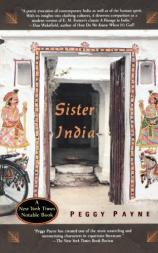Excerpt
Excerpt
Sister India

Chapter One
I am the keeper of a small guest house in the holiest city in India. For more than twenty years--all my adult life--I have lived here: my great weight sunk, torpid in the heat, into this sagged chair on my rooftop patio, or presiding downstairs at the table that guards the entryway: a once-American woman, taking down the passport number of each traveler, managing this inn for the Mohan Joshi family.
The newly arrived always stare: at my bloated flesh bathing in sweat, my fair coloring marked by freckles. I am not what one expects to find hidden away in Varanasi.
This is my home, though, the Saraswati, eleven rooms and a little restaurant, a view of the river, which at this moment burns with early morning light. From my roof, I watch it go by: the Ganges, Ganga it is called in Hindi by those who revere the river goddess.
I gave myself a Hindi name long ago, just weeks after my arrival here. I am Natraja. It has come to suit me well. I answer to it in my dreams; never mind that I was born Estelle, forty-odd years ago. Such an old-fashioned North Carolina farm-wife name did not fit me.
As Natraja, I have gained a modest fame. The Lonely Planet travel guide each year advises the adventurous to come to my table: "Mother Natraja at the Saraswati is worth a side trip. A one-woman blend of East and West."
What the guidebook does not mention is that I weigh perhaps four hundred pounds, twenty-five-or-so stone. I have more flesh than Ganesha, the elephant-faced god. Yet I'm told that, once on my feet, I move like an Indian, sinuous and flowing. I've darkened some from the sun, but my hair is still ashy-blond, long and straggly with threads of grey, and my eyes are light brown to the point of gold. Having these eyes, this huge body, helps me: people keep their distance. In a place just next to the Ganges, close to the pyres of burning bodies, newcomers especially are careful of anything that might unsettle them more.
Even so, the tourists ask me their questions. I rarely tell them anything. They can fend for themselves.
What they want to know I tell again and again to the waters that flow below this perch, a new audience with every moment, or to Shiva, with his many aspects and faces. In a sense, I have named myself for this most seductive deadly god; Natraja is Shiva's dance, dance of the one who creates and destroys. The river itself springs from his brow, carrying both waters of healing and ashes of the dead.
From where I sit, my left leg gone prickly from the edge of the chair, I can easily see one of the phallic shrines to Shiva, the linga. It is below, there just at the edge of the water, the stone image of a penis, waist-high nearly and thick as an oak, a smooth pillar giving off a dull glow where it is touched by sun, garlands of orange marigolds looped at its base. A worshipper adds a fresh offering now-he hunches like a gardener tending a shrub, arranging the yellow flowers, pouring river water from a brass kettle over the rounded head.
The base of the shrine is a vulva, but people rarely notice the female organs, no more than grooves which serve as a drain for the pourings of water. On some linga, a serpent swims in the female canal; on others it may coil upward, winding itself about the phallus, or not appear at all. My shrine is too far away for me to see its details. But then, I require no reminder of the serpent within....
Excerpted from Sister India © Copyright 2012 by Peggy Payne. Reprinted with permission by Riverhead. All rights reserved.
Sister India
- Genres: Fiction
- paperback: 320 pages
- Publisher: Riverhead Trade
- ISBN-10: 1573229105
- ISBN-13: 9781573229104






